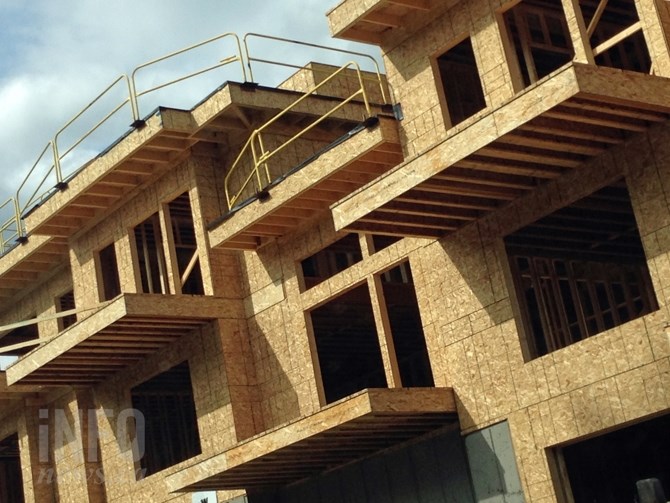Speed up housing builds by getting the province out of the 'roads': Kelowna planner
The federal government has given builders a major boost by eliminating the GST on rental housing but it’s city planner Ryan Smith who may actually get many Kelowna’s housing projects sped up by as much of a year.
Smith is hoping months of negotiations will pay off this fall and the Ministry of Transportation will change its rules to allow the City of Kelowna to sign off on developments within 800 metres of its highways instead of relying on a much slower provincial process to make those decisions.
As an extreme example, it took a year for the province to sign off on the new Kelowna Costco warehouse.
“We had two different government transportation teams with some of the best transportation planners in the field weighing in, for what,” Smith told iNFOnews.ca after a Kelowna Chamber luncheon today, Sept. 28. “We’ve got experts on Kelowna’s growth in our own staff. Why would we take up the expert time of the Ministry when they could be looking at the bigger picture in the rest of the province.
“We’re all busy and we complain about not enough resources so let’s use them better.”
That was part of his theme as one of three housing experts addressing the city’s housing crisis.
“When you go through the three levels of government and talk about the interest rates and talk to the person on the street, everybody thinks they know how to solve the problem,” Smith said. “There’s too many people with too many ideas and we’re not doing anything well. I think we need to start doing fewer things better.”
The city has an excellent relationship with the Ministry of Transportation, he said, holding monthly meetings dating back over the past 15 years.
But having the province studying most developments within 800 metres of Highways 97 and 33 means the province has to be consulted on projects stretching from Rutland to downtown, from Dilworth Mountain to Mission Creek in Midtown and almost to Clement Avenue downtown.
The exception is for the town centres that have been pre-zoned so the province has already signed off on those.
The city is also launching its AI Chatbot on Oct. 3, so people can go on “guided journeys” of the city’s bylaws to find what regulations apply to carriage houses for example. That may not be needed by seasoned developers who already know how to navigate through the system but for the uninitiated it should speed up the pace of construction.
“Every housing unit matters,” Smith said.
He also would like to see more standardization of bylaws and procedures throughout the Central Okanagan.
As for the GST rebate on the construction of rental housing, Kelowna-based Troika Developments co-CEO Brad Klassen said that could determine whether some rental housing projects will actually get built.
On a 125-unit market rental building costing $45 million, that’s a savings of $2.25 million.
Given the high cost of labour and money that allows the developer to go to a bank showing a 15% profit margin rather than the 10% they are often struggling with.
Klassen said 15% is like a magic number with lenders.
"When you hit 15%, all of a sudden it opens up your debt market and your capital markets and it allows you to actually finance the project that you want to build," he said
“It’s a small thing. It doesn’t mean rental rates are going to fall immediately but it might be enough to encourage developers around Canada that are sitting on the sidelines to actually decide to move forward. That’s going to increase supply and I’m a firm believer that if you can increase supply you’re going to start meeting some of the demand.”
Although it doesn’t mean rents will necessarily go down, it likely means they won’t go up as much as they have in recent years.
The other panel speaker was Kelowna-Lake Country MLA Norm Letnick who has started the YeYe Housing Society to build and sell homes at 25% below market prices.
The idea is to have land owners lease their land and for the society to build the homes without a profit margin since it’s a non-profit society. The landowner gets their money back when the homeowner sells and the capital gains tax will be spread out over a number of years since units will be sold at different times.
That’s not something that will work for everyone but it is one small piece of the puzzle in an effort to increase housing supply.
Canada Housing and Mortgage Corporation has said the pace of home construction has to double over the next six or seven years for there to by any hope of getting back to home affordability.
To contact a reporter for this story, email Rob Munro or call 250-808-0143 or email the editor. You can also submit photos, videos or news tips to the newsroom and be entered to win a monthly prize draw.
We welcome your comments and opinions on our stories but play nice. We won't censor or delete comments unless they contain off-topic statements or links, unnecessary vulgarity, false facts, spam or obviously fake profiles. If you have any concerns about what you see in comments, email the editor in the link above. SUBSCRIBE to our awesome newsletter here.




